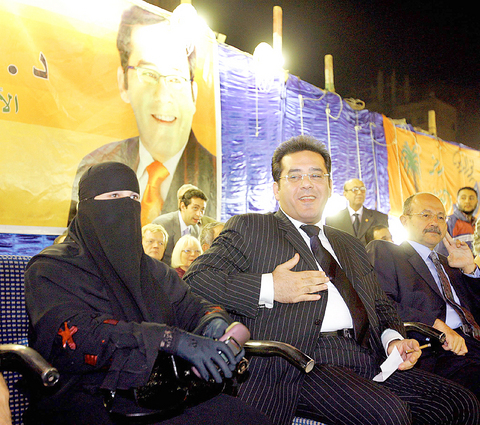Dove or tank? Tennis racket or mobile phone? In Egypt, where close to half of the population is believed to be illiterate, a good choice of campaign symbol can be decisive on polling day.
The ruling National Democratic Party (NDP) of President Hosni Mubarak makes no mistake and systematically reserves itself the Islamic crescent and the camel, which have proved their vote-grabbing potential over the years.
But the pecking order ends with the all-powerful NDP, leaving other candidates scrambling for the best remaining symbols.

PHOTO: EPA
In Cairo's impoverished Bulaq Dakrur constituency, the camel and the crescent will face a stiff challenge from the umbrella and the open book, logos for the Muslim Brothers and the hardline Gamaa Islamiya respectively.
"It's easier to remember the symbols than the names of the candidates," said Rasha Mohammed Ali.
No fewer than 529 candidates will battle it out today in the 25 constituencies of the Egyptian capital, one of eight governorates to be decided in the first wave of polling.
A total of 5,310 candidates nationwide are competing for parliament's 444 available seats during elections staggered over a whole month.
As he stares at the patchwork of posters plastered on the walls on Cairo's Dokki neighborhood, Mohammed Badri Abdallah offers his own explanation for the use of campaign symbols.
"These little logos were introduced for women, who often can't read," he said. According to most estimates, illiteracy rates hover above 40 percent for Egyptian men and reach the 50 percent mark for women.
The forest of campaign banners and posters mingling with decorations for the holy Muslim month of Ramadan and clusters of electricity cables and phone lines above Cairo's sandy alleyways can be overwhelming even to the literate.
Thus a distinctive symbol, whether representative or not of the party's platform or the candidate's profile, can be a serious asset.
On election day, some voters will tick off the symbol they can identify or simply their favorite logo rather than a name they can't read.
The determining factor in selecting a symbol often remains mysterious.
A female lawyer running in the central district of Dokki chose a cup, while others opted for the walking stick, the Ramadan lantern, the pencil or the rababa, a traditional Egyptian string instrument.
Nature-related symbols are considered safe choices, with doves, palm trees, grapes and suns among the most sought-after campaign logos.
Some would-be members of parliament wishing to convey a more modern image chose the light bulb, the aircraft and the mobile phone, while candidates in a more bellicose mood decided to run under the symbol of the tank, the sword or the handgun.
Independent candidate Adel Abdu is a contender for the prize of the healthiest symbol with a tennis racket, although courts are few and far between his destitute industrial neighborhood of Shubra al-Khima.
The Muslim Brotherhood, Egypt's largest opposition force which has promised to mount a tough challenge to the ruling party in the elections, has no symbol strategy and leaves each candidate to make his pick.

A fire caused by a burst gas pipe yesterday spread to several homes and sent a fireball soaring into the sky outside Malaysia’s largest city, injuring more than 100 people. The towering inferno near a gas station in Putra Heights outside Kuala Lumpur was visible for kilometers and lasted for several hours. It happened during a public holiday as Muslims, who are the majority in Malaysia, celebrate the second day of Eid al-Fitr. National oil company Petronas said the fire started at one of its gas pipelines at 8:10am and the affected pipeline was later isolated. Disaster management officials said shutting the

ACCESS DISPUTE: The blast struck a house, and set cars and tractors alight, with the fires wrecking several other structures and cutting electricity An explosion killed at least five people, including a pregnant woman and a one-year-old, during a standoff between rival groups of gold miners early on Thursday in northwestern Bolivia, police said, a rare instance of a territorial dispute between the nation’s mining cooperatives turning fatal. The blast thundered through the Yani mining camp as two rival mining groups disputed access to the gold mine near the mountain town of Sorata, about 150km northwest of the country’s administrative capital of La Paz, said Colonel Gunther Agudo, a local police officer. Several gold deposits straddle the remote area. Agudo had initially reported six people killed,

TIT-FOR-TAT: The arrest of Filipinos that Manila said were in China as part of a scholarship program follows the Philippines’ detention of at least a dozen Chinese The Philippines yesterday expressed alarm over the arrest of three Filipinos in China on suspicion of espionage, saying they were ordinary citizens and the arrests could be retaliation for Manila’s crackdown against alleged Chinese spies. Chinese authorities arrested the Filipinos and accused them of working for the Philippine National Security Council to gather classified information on its military, the state-run China Daily reported earlier this week, citing state security officials. It said the three had confessed to the crime. The National Security Council disputed Beijing’s accusations, saying the three were former recipients of a government scholarship program created under an agreement between the

SUSPICION: Junta leader Min Aung Hlaing returned to protests after attending a summit at which he promised to hold ‘free and fair’ elections, which critics derided as a sham The death toll from a major earthquake in Myanmar has risen to more than 3,300, state media said yesterday, as the UN aid chief made a renewed call for the world to help the disaster-struck nation. The quake on Friday last week flattened buildings and destroyed infrastructure across the country, resulting in 3,354 deaths and 4,508 people injured, with 220 others missing, new figures published by state media showed. More than one week after the disaster, many people in the country are still without shelter, either forced to sleep outdoors because their homes were destroyed or wary of further collapses. A UN estimate